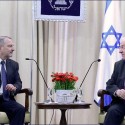Reuven Rivlin recently met with a group of ambassadors from Latin American countries. There was much light diplomacy, as is to be expected, but the President took the opportunity to express his plans on much larger issues and used the gathering as a call to action.
Present were ambassadors and deputy chiefs of mission from Argentina, Brazil, Colombia, Costa Rica, Chile, Dominican Republic, Ecuador, El Salvador, Guatemala, Honduras, Mexico, Panama, Paraguay, Peru and Uruguay.
Rivlin opened the gathering with an address to those present:
‘These are not easy times, when we are across the region dealing with the threat of terrorism and extremism. We are seeking a return to dialogue and the negotiating table, instead of unilateral steps. It is important that we return to negotiations, and arrive at agreements, which are, as always, subject to one key principle- the rule of democracy. Every treaty or agreement that Israel’s government has brought before the Knesset has been accepted by the power of authority of the majority.” The President urged the ambassadors to carry the message to the Palestinian Authority that unilateral initiatives will not lead to a viable solution. “The common fear we share is that of economic instability leading to an unstable democracy. At such times there is great importance in the strengthening of society in our country and our commitment to the values of democracy. These values are key to the security in our country, and our commitment to the values of democracy. These values are key to the security of our citizens.”
“We are very proud of the strong connection between Israel and the Latin American countries. This relationship impacts the lives of our peoples in many ways-from economy to security, from hi-tech to agriculture.”
Outgoing Ambassador of Uruguay, Bernardo Griever, asked about the upcoming elections and said that he would follow the process with interest even though he will no longer be in Israel. He expressed that it might be a difficult job for Rivlin to choose the next coalition.
Rivlin replied: “My decision will be in accordance with the unwritten constitution of the State of Israel. Nothing personal will come into it. The person who can best form a government will be chosen.” The president also made it clear that when receiving representative groups from the different parties, he would not let anyone off the hook. He will insist that each group make a recommendation, and in the case of those who might be reluctant or undecided, he would not permit them to leave without stating a preference.
Mexican Ambassador Frederico Salas Lotfe who initiated the gathering, said that he hoped there would be more such meetings. Rivlin replied that it would be easier if all the embassies were in Jerusalem and noted that some of the embassies which were originally in Jerusalem have since moved elsewhere.
Lotfe also said, “We are a group of countries with friendly dispositions towards Israel,”, emphasizing that while each country was interested in enhancing political and economic ties with Israel, “our primary interest is to see the Israeli and Palestinian peoples living in peace, prosperity and pride. We want to help both of you to find a common understanding and to make life in the region better.”
Ambassador Griever went on to say that he hoped that the peace process between Israel and the Palestinians would be resumed after the elections, and that the outcome would be positive. “This is a land of miracles – and it is time for another miracle.”
Rivilin responded by saying, that Israel is a democracy as well as a state of miracles “and we want a miracle that will enable all of us to live as regular people.” Palestinian President Mahmoud Abbas is desperate because he does not think that any agreement he might conclude with Israel will be accepted by the Palestinian people. Rivlin reasoned that this was because there is no proper democratic system in the Palestinian Authority. As proof he pointed out that when the vote on the Oslo Accords was taken in the Knesset, the vote was 61 in favor and 59 against. Despite the close vote, and despite the hard feelings, even the parties that had rejected the idea had to accept it under the rules of democracy.
Rivilin suggested that one of the major obstacles to a two state solution was that Abbas was unable to convince his own people to accept it.
“When you meet Abbas, ask him if he can convince his people to accept this.” Rivlin stated that there are many Palestinians who will reject the two state solution because they are totally opposed to Israel’s right to exist, even at the expense of having their own state.
“It’s a very complicated situation,” he said,” because if and when there is a State of Palestine, it will have relations with countries hostile to Israel such as Iran, and it can invite people from these countries to visit, thereby creating a danger to Israel. Although Israel is not at war with any Arab state, it is at war with terrorism, and those who use religion as a reason for their brutal actions.”
Rivlin seemed to feel that there was an inherent need for such a solution. We can’t live with walls. We have to live with open borders.”
A Startling Revelation
He did see Abbas as the obstacle, saying that he had already rejected conditions that were no longer feasible for Israel to return and offer again. Rivlin made a startling revelation. He said, Three months ago, US Secretary of State John Kerry offered Abbas conditions that were not authorized by Israel, but were offered with the knowledge of Israel. Abbas told Kerry that he would have to think about it. Kerry asked for a time frame and was told only a few days. No reply has been forthcoming to date.

